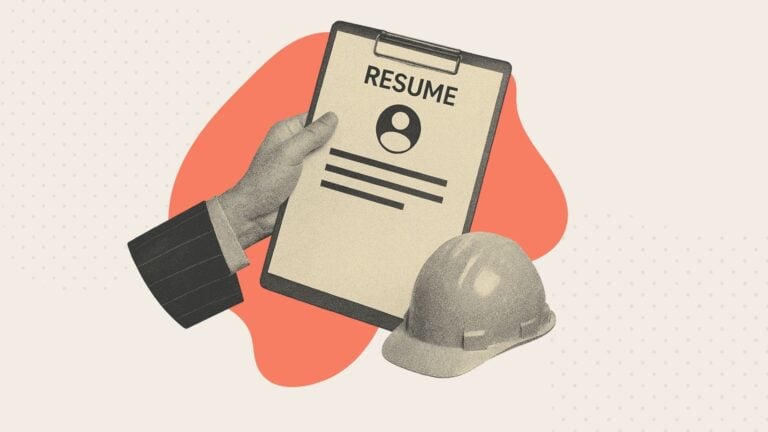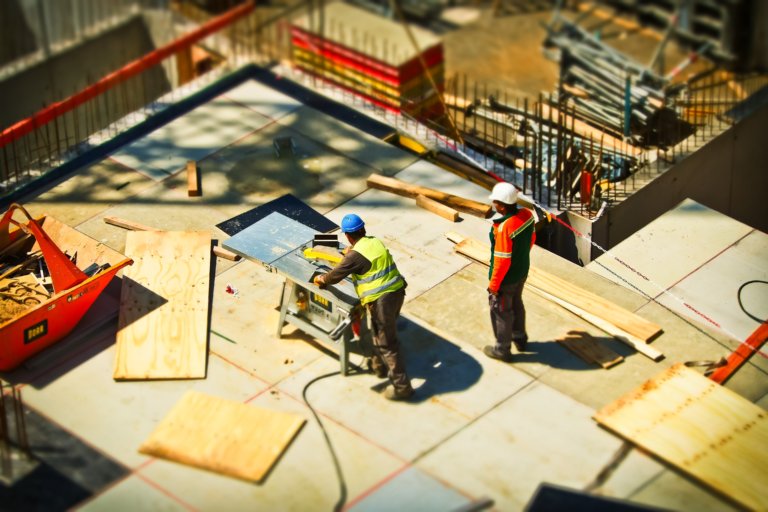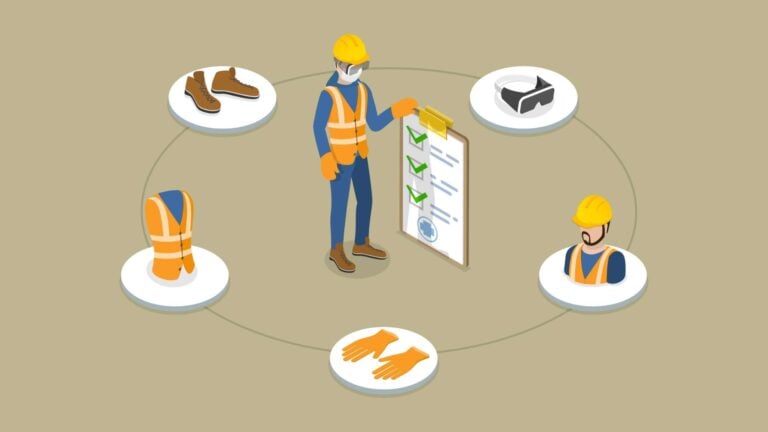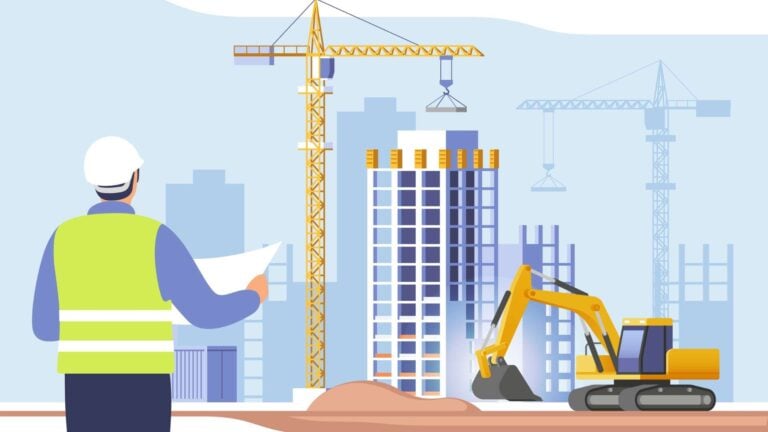Hiring construction workers is challenging when competition for skilled labor is high and project demands keep growing.
Even more frustrating, the wrong hire can slow progress, increase costs, and create safety risks on-site. The good news is that with the right approach, you can build a reliable crew that takes pride in its work.
In this guide, you’ll learn expert-backed strategies to attract, hire, and retain dependable construction employees for long-term success.
Key Takeaways
- Hiring decisions for construction projects directly impact project success. Effective hiring reduces turnover and prevents delays and budget overruns.
- To find skilled workers, you must craft engaging job descriptions, use various recruitment channels, and conduct thorough interviews.
- Prioritize safety and teamwork in your hiring process to enhance on-site efficiency and minimize accidents.
- Offer competitive compensation, professional development opportunities, and a culture of recognition to retain your top construction talent.
The Importance of Effective Construction Recruitment
In construction, an effective recruitment process is vital. Here’s why:
Direct impact on project success
Skilled construction workers keep projects moving on schedule, deliver quality results, and ensure everything meets strict regulations. One wrong hire, however, can result in rework, missed deadlines, and costly compliance issues.
When you bring the right people on board, you not only boost productivity but also build client trust and strengthen your company’s reputation.
Safety considerations
Construction is inherently risky, requiring skilled workers who are vigilant about safety protocols. According to the latest BLS Census of Fatal Occupational Injuries, construction had the most fatalities of any private industry sector in 2023, with 1,075 deaths.
Falls, slips, and trips made up nearly 40% of these fatalities. A workforce ill-equipped to handle risks can lead to increased accidents and safety breaches, while a strong workforce can prevent these hazards.
This Might Interest You
Learn about common safety hazards and OSHA safety tips in our comprehensive guide.
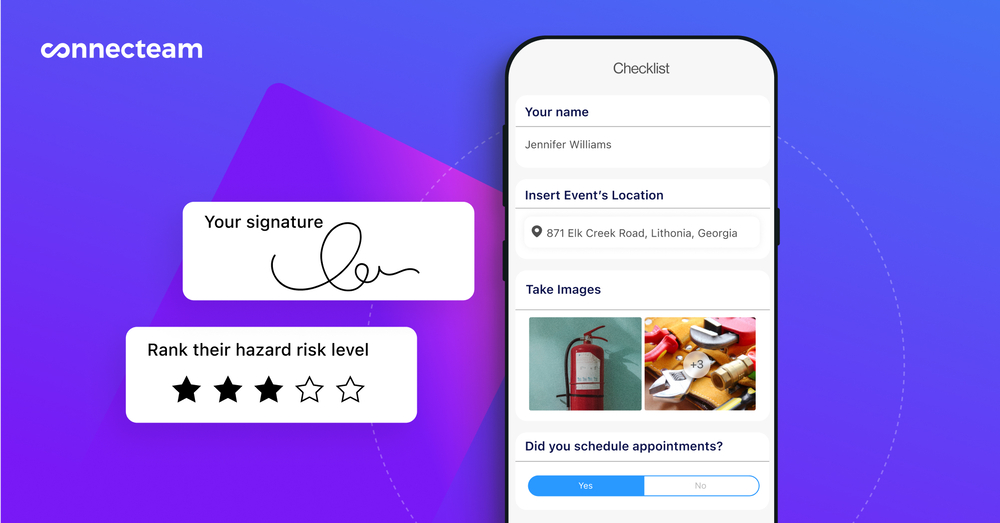
Team dynamics
The construction sector involves collaborative projects where teamwork is a necessity. As Ed Lane, President of Lane Homes & Remodeling, puts it: “Construction is team-oriented work, so reliability and a willingness to collaborate are essential.”
Individuals with the skills and abilities to work well in a team can significantly enhance the efficiency and atmosphere of the worksite, whereas disrupted team dynamics can lead to conflicts and reduced productivity.
Turnover and financial impact
High turnover remains a costly challenge. Recent industry data shows the construction turnover rate is still about 54%—far above most other sectors. A high turnover of workers creates instability in your workforce, interrupting project timelines and driving up recruiting and training expenses.
By hiring the right people and improving employee retention, you can minimize these disruptions and better control costs.
Reputation and growth
The quality of your hires directly shapes how clients, partners, and even potential employees see your business. Delivering consistent, high-quality work with a reliable crew builds trust and generates repeat business and referrals.
Over time, a strong reputation also makes it easier to attract top talent—because skilled workers want to join companies known for professionalism and safety.
What Qualities Make a Good Construction Worker?
Understanding how to find good construction employees begins with knowing what makes a construction worker effective and how they can contribute to your project’s success.
A skilled construction worker possesses a range of technical skills, including the ability to operate tools and machinery, familiarity with safety protocols, and trade-specific expertise. But attributes like physical endurance, attention to detail, communication, and teamwork are just as crucial.
Extensive experience isn’t always necessary, as qualities like a strong work ethic can help candidates with varying experience levels thrive in the construction environment.
Moreover, workers’ attitudes and problem-solving approaches are essential, as a proactive mindset can greatly impact project outcomes. A proactive worker can anticipate obstacles, take initiative, and adapt to changes.
Caitlin Scannell, Director of Operations at SnapADU, explained from her own hiring experience that the best construction employees bring more than technical ability: “Beyond technical proficiency, we prioritize individuals who are energetic, driven, and strong communicators. As a growing company, we value team members who embrace continuous improvement and actively contribute to refining our processes and culture.”
This Might Interest You
For a deeper breakdown of day-to-day responsibilities, see our guide on what a construction worker does.
How To Hire Reliable Construction Workers Fast: 8 Expert Tips for Hiring (+ Bonus Tip)
Create an effective job post
Finding good construction employees starts with crafting a strong construction worker job description. When you clearly define the role, highlight your culture, and make the posting easy to understand, you’ll attract better candidates and save time in the hiring process. Here’s how to write one:
Clearly define the role
Clearly outline the role, and highlight the required skills and experience. For instance, a job description for a site manager position should mention managing residential projects or proficiency in construction management software.
A construction worker’s duties and responsibilities might include:
- Preparing construction sites.
- Operating heavy machinery.
- Loading and unloading building materials.
- Assisting with construction operations.
- Following safety procedures.
- Using tools and equipment.
- Reading and interpreting plans.
- Collaborating with team members.
Also, clearly detail the qualifications and requirements, such as:
- High school diploma or equivalent (vocational training or trade certification is a plus).
- Ability to operate heavy machinery (certification is a plus).
- Strong understanding of construction tools and equipment.
- Willingness to work in various outdoor conditions.
This Might Interest You
If you’re building your team as part of launching a new company, check out our full guide on starting a construction business for step-by-step advice on planning, setup, and compliance.
Showcase your company culture and benefits
Don’t just describe the job—describe why someone should want to work for you. Share what sets your company apart, such as sustainable building practices, professional development programs, health benefits, or flexible schedules. Candidates are more likely to apply when they see your mission and values align with theirs.
Industry advisor Benjamin Holmgren notes that too many job ads overwhelm applicants with requirements. Instead, he suggests to “rewrite your job postings like a sales letter.” This means focusing on what candidates want from their next role, the upside of joining your team, and making the process clear from the start.
Culture is also a major draw, especially for younger workers. As Ed Lane, President of Lane Homes & Remodeling, explains: “Younger workers entering the industry often value culture and career growth as much as pay. Companies that show a clear path for advancement and create a positive team environment are better positioned to bring in strong talent.”
Use clear language
Write your job post in plain, engaging language so candidates can quickly understand what the role involves. Avoid heavy jargon or unexplained acronyms that could confuse applicants—especially those moving into construction from other industries.
For example, spell out “mechanical, electrical, and plumbing drawings” instead of just saying “MEP drawings.” Likewise, say “concrete finishing” rather than internal shorthand like “CF.” Clear language makes your posting more approachable and draws in a wider pool of qualified candidates.
Optimize for search engines
Incorporate relevant construction-related keywords to enhance the visibility of your job posting online, expanding your reach to more qualified candidates. For example, instead of writing “looking for help on site,” say “hiring construction laborers with framing and concrete work experience.”
Including terms like general maintenance, excavation, plumbing, carpentry, and power tools in natural sentences helps your posting show up when job seekers search for those skills.
Post your job in the right places
Wondering how to find and hire construction workers with your job post? The best way to find construction employees is by strategically posting your job ad where candidates will see it.
Use online job boards
Post your jobs on boards that specialize in construction and related fields.
Websites like Indeed, Monster, and Craigslist are great, but niche job boards catering to construction professionals—like ConstructionJobs, iHireConstruction, and Roadtechs—can help you reach candidates actively seeking opportunities in your industry.
Embrace social media
Platforms like LinkedIn are ideal for job seekers and professional networking. At the same time, you can use Facebook and Instagram to showcase your company culture and attract younger or more digitally savvy candidates. Offering glimpses into your company’s day-to-day operations can attract candidates interested in your construction work.
Network through industry associations
Construction industry associations and local trade groups—such as the Associated General Contractors of America (AGC) and Associated Builders & Contractors (ABC)—can be invaluable for finding skilled workers.
These groups have job boards, mailing lists, and networking events. They can help you reach individuals already engaged and invested in the construction industry.
Engage in community outreach
Participating in local job fairs, vocational schools, and community colleges can help you connect with emerging talent eager to work for construction companies.
Encourage employee referrals
Encourage your current employees to refer skilled professionals from their network with an employee referral program. Often, workers who already understand and appreciate your company’s culture and standards can recommend the best candidates.
Pro Tip
Use a communication app like Connecteam to update your employees about open positions. For employees who refer skilled candidates, offer employee recognition gift cards, show appreciation with personalized badges, or give a shout-out in the company feed.
Get started with Connecteam for free today!
Conduct thorough interviews
After you have a pool of qualified applicants, conduct interviews to assess them thoroughly. Develop questions to ask all candidates. Your questions should cover technical skills, experience working in similar jobs, problem-solving abilities, and handling of workplace challenges.
Standard questions
These questions help you understand a candidate’s basic qualifications and experience. Ask about their previous construction roles and responsibilities so you can see how closely their background matches your needs.
Example question: “Can you describe your role and responsibilities in your last construction project?”
Practical skills questions
Ask about their experience with specific equipment or tasks relevant to the job. This is where you confirm that candidates can do the core work safely and efficiently.
Example question: “Can you walk me through your process of interpreting and following construction blueprints?”
Safety culture questions
Strong technical skills aren’t enough if candidates cut corners on safety. Ask questions that reveal their mindset and past behavior.
Examples:
- “What would you do if you saw a coworker not wearing PPE?”
- “Tell me about a time you stopped unsafe work on a project. What happened next?”
- “What’s the most important safety rule you follow every day?”
Problem-solving questions
Pose hypothetical scenarios or discuss past situations to assess candidates’ abilities to handle unexpected situations and their problem-solving approaches. This gives you a sense of how candidates think under pressure and adapt when plans change.
Example question: “How would you handle an unexpected delay in material delivery?”
Communication and teamwork questions
Great construction projects depend on collaboration, so ask questions that reveal how candidates work with others.
Example question: “How have you resolved a conflict with a coworker?”
Pro Tip
Involve key team members in the interview process to get a well-rounded view of how each candidate might fit in at your company. With Connecteam, you can also create structured evaluation checklists, allowing multiple interviewers to score candidates consistently.
Real-world insight: Caitlin Scannell, Director of Operations at SnapADU, shared how her team has modernized interviews to make them more effective: “Our initial interview rounds are conducted via video conference. With candidate consent, we record and transcribe these meetings to share with the broader hiring team. This approach streamlines the process by minimizing repetitive questions across interview stages and allows for more thoughtful evaluation of each candidate’s qualifications by multiple stakeholders.”
You can adapt a similar process by using tools like Zoom or Skype for first-round interviews, making it easier to involve additional stakeholders and keep records. This not only reduces redundancy but also helps you compare candidates fairly across the board.
Conduct skills assessments
Conducting comprehensive skills assessments is another vital step in the construction hiring process, providing a deeper understanding of a candidate’s technical abilities. Assessments can help you select candidates to hire.
Assess practical skills
In construction, practical skills are as essential as theoretical knowledge. Consider setting up real-world scenarios or skill tests relevant to the job. These could involve reading blueprints, executing a small task, or demonstrating safety knowledge through a mock drill. These assessments give you a clear picture of the candidate’s proficiency.
For instance, ask the candidate to perform a basic construction task, like measuring and cutting materials, to assess their proficiency. (You can do this during or after the interview process.)
Conduct a hands-on job trial day
Inviting potential hires for a trial day is an effective strategy in the construction hiring process. It offers insights into a candidate’s skills, work ethic, and team fit.
Here’s how to implement this strategy effectively:
- Describe the trial day’s activities, like specific tasks and team interactions, to prepare the candidate.
- Meet all legal and safety requirements, like having on-site supervision and temporary workers’ compensation insurance, before the trial day.
- Have potential hires work with current team members to assess fit and teamwork skills.
- Look beyond technical skills to evaluate problem-solving, communication, and collaboration.
- Give constructive feedback to candidates after a job trial day. This will enhance their professional development and your company’s reputation, regardless of whether you plan to hire them.
- Collect team feedback and assess the candidate’s performance and integration.
Pro Tip
Use Connecteam to build digital checklists for trial days. Plus, supervisors can use our free construction employee evaluation form (insert link) to standardize how they score candidates on technical skills, teamwork, and safety awareness directly in the app. This makes evaluations consistent across interviewers and gives you a clear record to compare candidates later.
Connecteam also ensures safety by alerting you when workers, including trial employees, leave designated work zones. Connecteam also offers digital incident report forms that allow workers to report potential hazards instantly.
Get started with Connecteam for free today!
Offer competitive compensation
Offering competitive compensation is key to attracting and retaining top talent in the construction industry—whether you’re hiring full-time, part-time, or contract workers.
Understanding current market standards, including US minimum wage laws, is crucial for all types of employment. Minimum wage rates vary, often exceeding the federal minimum hourly rate of $7.25. According to the U.S. Bureau of Labor Statistics, construction laborers earn a median of $22.63 per hour, with the mean hourly wage at $25.06 as of 2024.
Want to know how to attract construction workers with competitive compensation? Pay them the same as or more than the average. In addition to pay, offer other forms of compensation—from basic benefits like health insurance to perks such as performance-based bonuses, tool reimbursements, or retirement plans.
Because compensation standards frequently change in the construction market, you must regularly review and adjust your compensation packages. This ensures they remain competitive and fair.
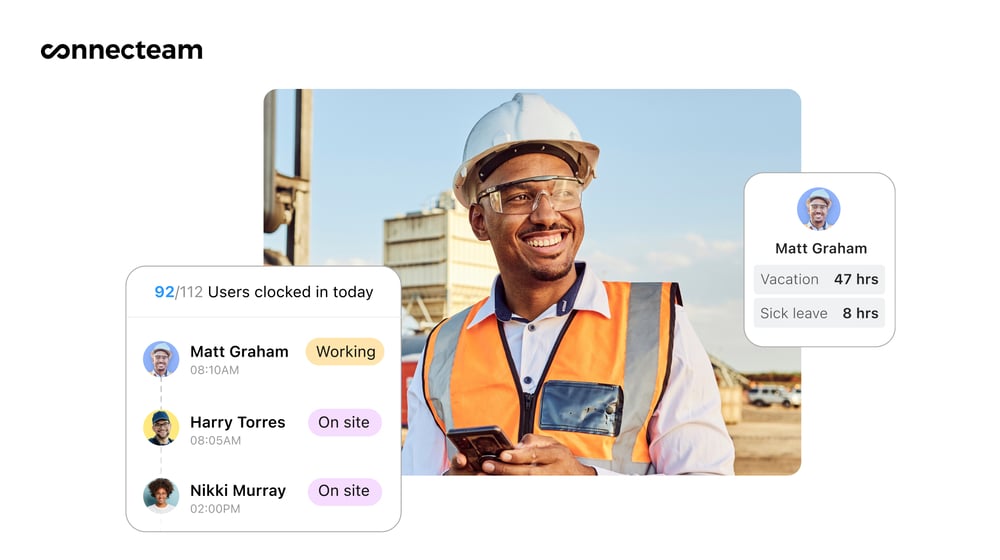
Invest in training and development
Effective training improves your team’s skills while enhancing safety and productivity on the job. Here’s how to build a strong training pipeline:
Offer onboarding training
Implement a comprehensive onboarding program that familiarizes new hires with your company culture, safety protocols, and job responsibilities. This initial phase is crucial for setting new employees up for success from day one.
Did You Know?
With Connecteam’s employee training software, you can onboard new hires with tailored courses on construction topics—featuring quizzes, videos, and infographics. Current workers can also access and complete courses anytime from their mobile devices. You can track their training progress in real time, ensuring everyone stays current with industry-specific learning.
Provide ongoing training
With the construction industry’s constant evolution, keeping your team updated on the latest technologies and methods is vital. Hold regular training sessions—for example, monthly, quarterly, or during significant industry changes—to ensure your workers are always aligned with current best practices.
Encourage certifications
Support employees in gaining additional certifications by providing resources, study time, or financial assistance. A more skilled workforce benefits both your projects and your reputation.
This Might Interest You
Learn about some excellent certifications in our guide on 9 construction certifications to advance your team and business.
Develop apprenticeship programs
Creating apprenticeship programs within your organization can be a great way to develop your existing workers’ skills through training and help you find new talent.
These programs combine on-the-job training with classroom instruction, providing apprentices with a comprehensive skill set. Apprentices work under mentors, gaining practical experience on various tasks and projects. According to official statistics, 90% of apprentices remain employed after completing their program, making this one of the most reliable pathways to full-time hires.
Measure the impact
Continuously evaluate the effectiveness of your training initiatives. Ensure they align with your employees’ needs and your company’s goals. Gathering feedback and adapting your programs accordingly can lead to more effective training and higher employee satisfaction.
Consider seasonal hiring for peak periods
Demand for labor in the construction industry varies with the seasons, influenced by weather, project cycles, and regional construction trends. Understanding and effectively managing seasonal hiring can be vital to maintaining productivity and controlling project costs.
Optimizing seasonal hiring involves many of the same strategies as regular hiring, such as effective training, fair compensation, and compliance. But it also requires its own approaches. These include:
- Identifying peak periods: Be prepared for times of high demand.
- Building a talent pool: Maintain a list of dependable seasonal workers, including past employees and recruits identified during quieter periods.
- Monitoring worker performance: Evaluate seasonal workers’ performance for potential rehire or full-time employment opportunities.
- Implementing flexible scheduling: Offer flexible work hours, including shift swapping, to attract seasonal workers and ensure you’re always adequately staffed.
- Using technology: Shorten time-to-productivity with digital solutions that streamline hiring.
Did You Know?
Connecteam is an all-in-one digital solution that makes employee onboarding for seasonal hires a breeze. You can onboard recruits in minutes, assign mobile training modules, and manage shift swaps all from one app. Its built-in scheduling and time clock features let you track attendance, approve hours, and keep sites staffed without the hassle of spreadsheets.
[/box2″]
Strengthen retention with recognition and culture
Even after hiring the right people, keeping them engaged and motivated is just as important as finding them. High turnover disrupts projects and increases costs, so focusing on recognition and culture-building will help you retain your best employees.
Recognize achievements
Employees who feel valued are more likely to stay. Recognition can be formal—like bonuses or awards—or informal, such as public praise during team meetings. As Caitlin Scannell, Director of Operations at SnapADU, shares: “We highlight wins in real time. Our internal ‘Kudos Korner’ recognizes team members who receive praise from clients or subcontractors, giving public credit for a job well done.”
Foster a strong company culture
Build a culture where employees genuinely want to support one another and contribute to a shared mission. Whether through regular team-building activities, celebrating milestones together, or encouraging collaboration on the jobsite, a strong sense of community keeps employees engaged.
Provide growth opportunities
Retention also depends on showing workers they have room to advance. This could include cross-training, leadership opportunities, or sponsoring certifications. As Ed Lane, President of Lane Homes & Remodeling, notes: “Construction workers want to see a path forward. To enable this, I recommend cross-training in different trades, offering continuing education, or helping someone step into a leadership role.”
When employees can picture their future with your company, they’re less likely to leave for other offers.
Pro Tip
Use Connecteam’s employee recognition software to spotlight achievements, share shout-outs in the company feed, or award digital badges. Consistent recognition helps employees feel appreciated and boosts morale.
Bonus tip: Check references and reputation carefully
Many construction managers focus heavily on interviews and skills tests but skip thorough reference checks. Yet in a field where safety, reliability, and teamwork are critical, calling a candidate’s former supervisors or clients can uncover dealbreakers—or validate a great hire.
- Verify licenses, certifications, and training directly rather than relying only on resumes.
- Confirm employment basics (job titles, dates, eligibility for rehire) to avoid legal pitfalls.
- Use reputation checks carefully—industry word-of-mouth can sometimes reveal useful insights.
Pro Tip
Standardize your reference checks with a simple form that focuses on factual information (employment dates, role, eligibility for rehire). Using digital tools like Connecteam’s digital forms can help keep the process consistent and reduce risk.
Bottom Line on Hiring Construction Workers
Hiring the right employees is critical, especially in an industry grappling with labor shortages, high turnover rates, and legal and safety considerations. These challenges highlight the need to know how to find good construction employees.
To select great workers for your business, start by creating compelling and well-advertised job posts. Then, conduct effective interviews and practical trials to assess candidates thoroughly. Back this up with competitive pay and ongoing training to help them grow. Finally, strengthen retention by recognizing achievements and building a supportive culture where employees see a future with your company.
Take your construction hiring to the next level by using the Connecteam construction employee management app. It can help streamline recruitment, schedule training and onboarding, track employees, and comply with legal and safety regulations.
Get started with Connecteam today for free!
FAQs
How much are construction workers paid in the US?
According to Talent.com, the average annual salary for construction workers in the US is $50,000 ($25.32/hour) as of September 2025.
How much does it cost to hire construction workers?
The cost of hiring construction workers encompasses more than hourly or contractual rates. It includes recruitment and training expenses, as well as benefits such as health insurance, bonuses, retirement plans, and paid time off. It also includes protective equipment and safety gear, overhead costs like administrative expenses and utilities, and workers’ compensation insurance.


